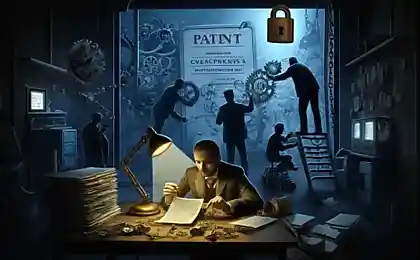722
Inventions that are not in need of improvement (8 photos)
Imagine that someone will hand you the original typewriter Shuolza and Glidden 1868 and says that his coming thesis you have to write using only the antiques. Here it really would have been hellish torment! The speed at which you typed on a regular keyboard, will decrease significantly when using a typewriter, since your fingers are not used to bang on the keys with such force. In addition, you will not even see what is printed on the sheet. Without a doubt, modern analogues device for typing much more practical and more convenient to their predshestvennikov.My constantly improve everything that we created earlier. However, there are things that for 100 years and more, but they are still considered to be perfect. Of course, over time, they undergo some aesthetic changes, and their production technology improved. But if you got into the hands of the original one of those things, you could easily use it for its intended purpose. So, before you 8 inventions that were so good that never needs to be improved.
1. Barbed wire

Let's say you live somewhere in the state of Oklahoma, in the court in 1880, and you want to keep your cows out of your corn. Which exit? "We need to build a fence!" - You might say. Well, good luck to you. That's just, given the size of your field of wood for a fence you are unlikely to be enough. And if you try to build your ranch 25-kilometer fence of stone or brick, you probably already have time to grow old by the end of the work. And what do you do? The construction of fence with barbed metal elements appear in different patent offices around the world in the 1860s, but nothing came of it. Joseph Glidden, Jacob Heysham, Charles Francis Uoshbёrn and Isaac Ellwood put a lot of effort to find an easy and cheap way to create a barbed wire. In the late 1870s, barbed wire became available.
2. bubble wrap

At the end of 1950 to Alfred Fielding and Marc Chavannes brilliant idea in the spirit of the Space Age: plastic, three-dimensional visual and tactile wallpaper. Only for experienced people who want to decorate your perfect home. Unfortunately, glued together plastic shower curtains with air inside does not become popular. However, like many other innovators, they just changed the focus of its activities, turning failure into success. Forget about the wallpaper. In 1964, they patented a "method of producing a multi-layer cushioning material." Thus, bubble wrap was one way to keep your dishes intact during transportation.
3. Rocking chair
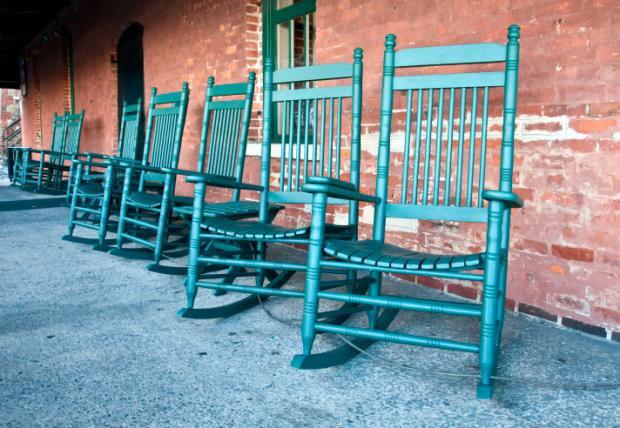
Rocking chairs were invented relatively recently in America. Some people say that they came up with himself, Benjamin Franklin, but it is not. The first chair appeared in the early 18th century, and particularly applauded by people suffering from back pain and rheumatism. It is not just soothing rocking motion that favorably affect your health. Rocking chair automatically adjusts the center of gravity of a person sitting on it, allowing you to take the most comfortable position.
4. Clip
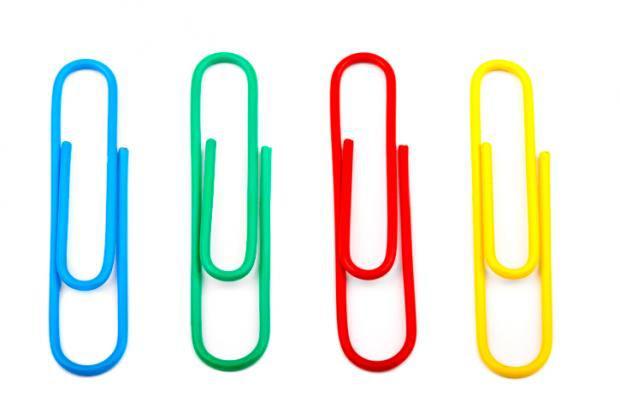
With the advent of easily bent wire has been created so many variations of current staples that they would be enough for a language characters. Patent offices of the late 19th century were overwhelmed imaginable and unimaginable forms of clips, which included curls, wings, triangles, pretzels, etc. And all of them have been patented, except that we use for 100 years. In the end, the controversial origin oblong clip supplanted all its competitors on the sidelines of history.
5. Tea
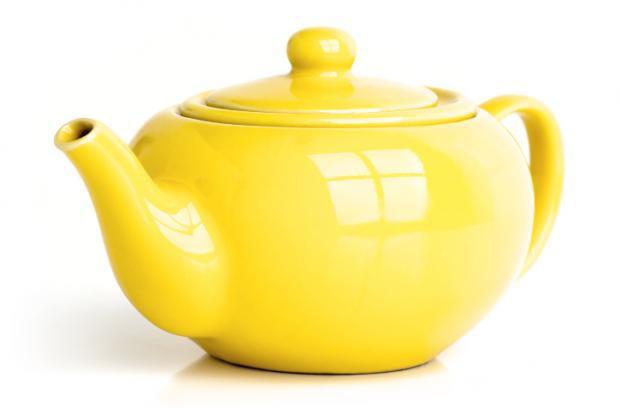
Archaeologists believe that the kettles were during the reign of the Yuan Dynasty, which began in 1279. These kettles were made of clay and is likely to serve as a universal device for tea. In the kettle to boil water to make tea, and even drank from them. (It was believed that the original kettles were noddle, and drank tea directly from the spout.) Today's kettles amazing variety: you can buy tea from a paper or titanium, but perfect design handle, lid and spout remains unchanged.
6. Fly Swatter
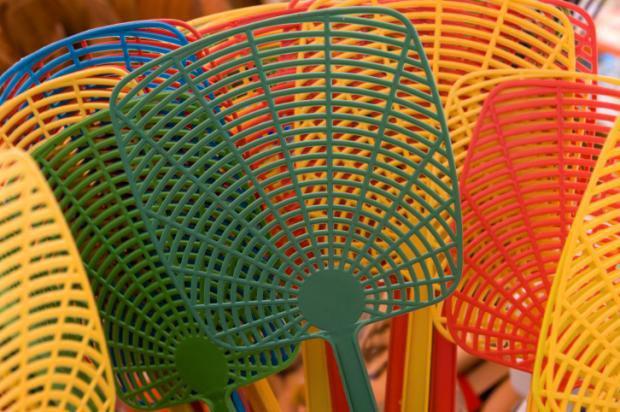
Long handle, square mesh and brainless fly that beating his head against the window glass, putting at risk. The perfect alignment. In 1900, Robert Montgomery patented invention called "Fighter Flies," which was later popularized by Dr. Samuel Krambaynom in 1905. He urged residents of Kansas destroy flies, where possible, to stop the spread of disease. He even borrowed chants ftbolnoy team Topeka "to hit the ball!" And changed it to "Hit a fly!" And no guns or vacuum miserable Velcro will not be able to compete with the fly swatter in popularity. Because people always liked to bang anything with a stick.
7. Mousetrap
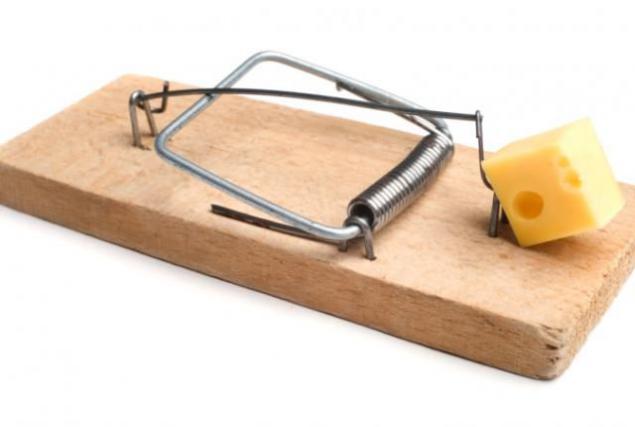
Even women with severe temper when a flattened mouse mousetrap can happen hysteria: it is waving his arms and publish meowing sounds, feeling something between pity and disgust. But there was a time when the loss of self-control when a mouse was an unaffordable luxury. Mice were pests: they threatened the health, young children, and food supplies.
The spring trap, invented by William Hooker, became a blessing to the entire civilized world, because it is even better than a cat, because the chase and eliminated the element of chance. In 1903, John Mast has improved the design of mousetrap, making it more reliable and less traumatic for anyone who uses it. It is this design we use to this day.
8. Lego

Yes, you can buy a set for 3000 rubles. and collect a copy of the Ferrari Formula 1 1: 9, or with their own hands to create a shocking piece of modern art. But the first Lego, those mutually interlocking blocks that are in your childhood still exist and are commonly used.
Carpenter Ole Kirk Christiansen began producing their new-fangled "automatically mating bricks" in 1949. He used plastic in those years: expensive, fragile, and possibly even radioactive. So first cubes will not find popularity with parents who were convinced that the "real" toys made of wood and metal.
Eventually his son Gottfried improved manufacturing process and patented the modern Lego in 1958. It is noteworthy that the first part, made over 50 years ago, can easily be used with brand new Lego parts without fear of inconsistencies.
1. Barbed wire

Let's say you live somewhere in the state of Oklahoma, in the court in 1880, and you want to keep your cows out of your corn. Which exit? "We need to build a fence!" - You might say. Well, good luck to you. That's just, given the size of your field of wood for a fence you are unlikely to be enough. And if you try to build your ranch 25-kilometer fence of stone or brick, you probably already have time to grow old by the end of the work. And what do you do? The construction of fence with barbed metal elements appear in different patent offices around the world in the 1860s, but nothing came of it. Joseph Glidden, Jacob Heysham, Charles Francis Uoshbёrn and Isaac Ellwood put a lot of effort to find an easy and cheap way to create a barbed wire. In the late 1870s, barbed wire became available.
2. bubble wrap

At the end of 1950 to Alfred Fielding and Marc Chavannes brilliant idea in the spirit of the Space Age: plastic, three-dimensional visual and tactile wallpaper. Only for experienced people who want to decorate your perfect home. Unfortunately, glued together plastic shower curtains with air inside does not become popular. However, like many other innovators, they just changed the focus of its activities, turning failure into success. Forget about the wallpaper. In 1964, they patented a "method of producing a multi-layer cushioning material." Thus, bubble wrap was one way to keep your dishes intact during transportation.
3. Rocking chair

Rocking chairs were invented relatively recently in America. Some people say that they came up with himself, Benjamin Franklin, but it is not. The first chair appeared in the early 18th century, and particularly applauded by people suffering from back pain and rheumatism. It is not just soothing rocking motion that favorably affect your health. Rocking chair automatically adjusts the center of gravity of a person sitting on it, allowing you to take the most comfortable position.
4. Clip

With the advent of easily bent wire has been created so many variations of current staples that they would be enough for a language characters. Patent offices of the late 19th century were overwhelmed imaginable and unimaginable forms of clips, which included curls, wings, triangles, pretzels, etc. And all of them have been patented, except that we use for 100 years. In the end, the controversial origin oblong clip supplanted all its competitors on the sidelines of history.
5. Tea

Archaeologists believe that the kettles were during the reign of the Yuan Dynasty, which began in 1279. These kettles were made of clay and is likely to serve as a universal device for tea. In the kettle to boil water to make tea, and even drank from them. (It was believed that the original kettles were noddle, and drank tea directly from the spout.) Today's kettles amazing variety: you can buy tea from a paper or titanium, but perfect design handle, lid and spout remains unchanged.
6. Fly Swatter

Long handle, square mesh and brainless fly that beating his head against the window glass, putting at risk. The perfect alignment. In 1900, Robert Montgomery patented invention called "Fighter Flies," which was later popularized by Dr. Samuel Krambaynom in 1905. He urged residents of Kansas destroy flies, where possible, to stop the spread of disease. He even borrowed chants ftbolnoy team Topeka "to hit the ball!" And changed it to "Hit a fly!" And no guns or vacuum miserable Velcro will not be able to compete with the fly swatter in popularity. Because people always liked to bang anything with a stick.
7. Mousetrap

Even women with severe temper when a flattened mouse mousetrap can happen hysteria: it is waving his arms and publish meowing sounds, feeling something between pity and disgust. But there was a time when the loss of self-control when a mouse was an unaffordable luxury. Mice were pests: they threatened the health, young children, and food supplies.
The spring trap, invented by William Hooker, became a blessing to the entire civilized world, because it is even better than a cat, because the chase and eliminated the element of chance. In 1903, John Mast has improved the design of mousetrap, making it more reliable and less traumatic for anyone who uses it. It is this design we use to this day.
8. Lego

Yes, you can buy a set for 3000 rubles. and collect a copy of the Ferrari Formula 1 1: 9, or with their own hands to create a shocking piece of modern art. But the first Lego, those mutually interlocking blocks that are in your childhood still exist and are commonly used.
Carpenter Ole Kirk Christiansen began producing their new-fangled "automatically mating bricks" in 1949. He used plastic in those years: expensive, fragile, and possibly even radioactive. So first cubes will not find popularity with parents who were convinced that the "real" toys made of wood and metal.
Eventually his son Gottfried improved manufacturing process and patented the modern Lego in 1958. It is noteworthy that the first part, made over 50 years ago, can easily be used with brand new Lego parts without fear of inconsistencies.
